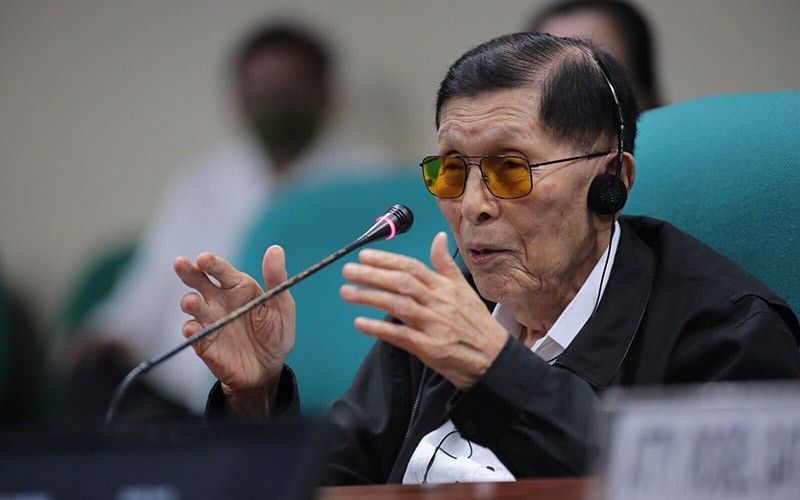A long chapter in Philippine political history has finally come to an end. On November 13, 2025, former Senate President Juan Ponce Enrile , or better known as JPE, passed away quietly at the remarkable age of 101. His passing not only left a void in the country’s political landscape ; it prompted intense reflection and examination of his seven decades of public service — a career that could be considered the longest, most colorful, and most controversial in the history of the Republic.
The news of his death was confirmed after it was reported that he was confined to the Intensive Care Unit (ICU) due to pneumonia . The illness seemed to be a simple end to a life that was far from simple. Enrile, who was born on February 14, 1924, even got his P100,000 Centenarian Cash Gift in 2024, coinciding with Valentine’s Day and his 100th birthday, based on the Centenarians Act of 2016. His longevity in life attested to his survival instinct , which also illustrated his survival in politics.

The Legal Genius and the Beginning of Power
Even before he became the center of political storms , Juan Ponce Enrile was an intellectual and legal prodigy . At the University of the Philippines (UP) , he graduated with a Bachelor of Laws in 1949 as valedictorian and cum laude . That same year, he demonstrated his legal brilliance when he passed the Bar Exam and ranked as the Number 11 bar topnotcher . He further strengthened his legal knowledge when he obtained a Master of Laws from the prestigious Harvard Law School in Massachusetts, USA, where he studied taxation and corporate law in depth . His legal acumen opened doors for him in the world of power.
His public service career began in 1966 as Under Secretary of the Department of Finance . He rose quickly to serve as Secretary of the Department of Justice (1968-1970). But his name became etched in history when he was appointed Secretary or Minister of the Department of National Defense in 1972.
The Architect of Martial Law: A Dark Chapter
Enrile’s biggest mark on the country’s history was his role in the declaration of Martial Law in September 1972 under the administration of former President Ferdinand Marcos. According to history, Enrile was one of the main figures behind the declaration. As Defense Minister , he had great control over the military and the implementation of martial law. This period was characterized by widespread human rights violations , the silencing of critics, and excessive power by the military. Enrile’s name became synonymous with the iron fist of dictatorship.
However, Enrile’s survival instinct and political dexterity were once again tested and demonstrated in February 1986. In a surprising and historic move , he broke away from Marcos’ support and, together with former Vice Chief of Staff Fidel Ramos, became the catalyst for the EDSA People Power Revolution . His defection from the Marcos regime gave moral legitimacy and strength to the civilian uprising that ousted the dictator. His role in EDSA demonstrated his political chameleon skills—from being a defender of dictatorship to being a liberator of democracy. It is this contradiction in his legacy that continues to make it difficult for historians and political analysts to give him a single label .

The Political Survivor in the Senate and the Controversies
After the Revolution, Enrile returned to the political arena as a Senator (1987). Over the course of several terms, he proved his mettle as a legislator, debater , and political strategist . The pinnacle of his senatorial career was when he was elected Senate President in 2008 and served as the leader of the Upper House until 2013. During this time, the Senate was known for its assertiveness and independent streak .
But Enrile has not escaped controversy. In 2013, he resigned as Senate President amid intense public outrage and an investigation into the Pork Barrel Scam —a massive corruption scandal that damaged the credibility of many politicians. The indictment and subsequent legal battle were among the stains on his long career . Despite the accusations, his legal skills and political influence have kept him in the limelight .
The Last Full Circle in Malacañang
Despite his age and health issues , he remained active in politics. Enrile’s last political role brought an eerie full circle to his life. In 2022, President Ferdinand “Bongbong” Marcos Jr. appointed him as Chief Presidential Legal Council (CPLC) .
His service to the son of the former president he once left behind on EDSA provided the final twists in his saga . This appointment provided symbolic validation for the Marcoses’ return to power and demonstrated Enrile’s political pragmatism . In the latter part of his life, he returned to Malacañang , ending his career under the same name that shaped his destiny and demise .
The passing of Juan Ponce Enrile marks the end of a personal journey and the end of a colorful and controversial chapter in the Philippines. His legacy is not easy to judge . He was a legal genius who served with dedication , but he was also a man symbolizing Martial Law and political survival . His life is a mirror of Philippine politics: full of paradox , power , and the relentless quest for influence . With his departure, it is certain that his name—Juan Ponce Enrile—will remain one of the most controversial and unforgettable parts of history.